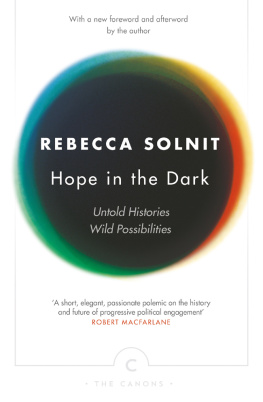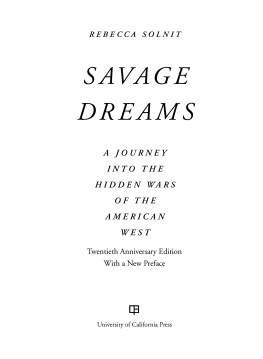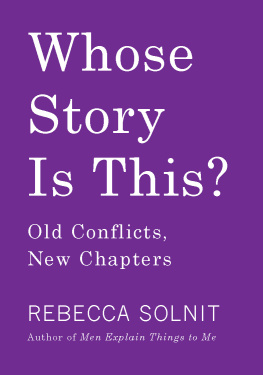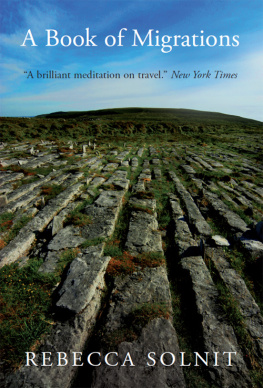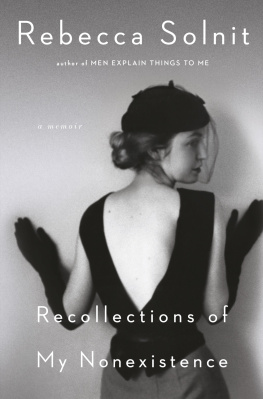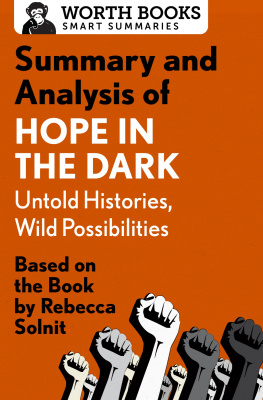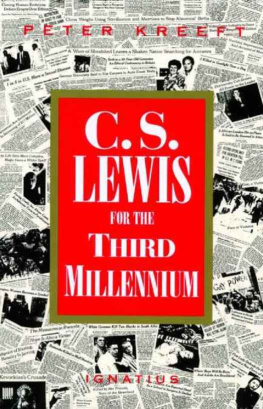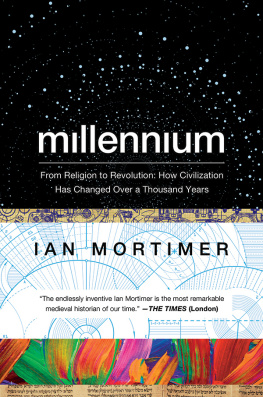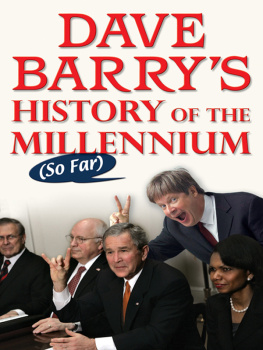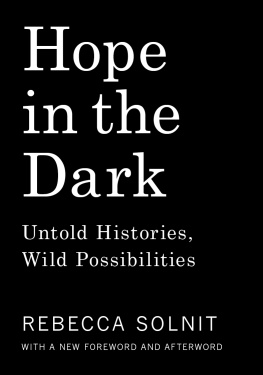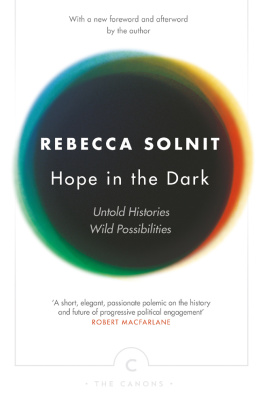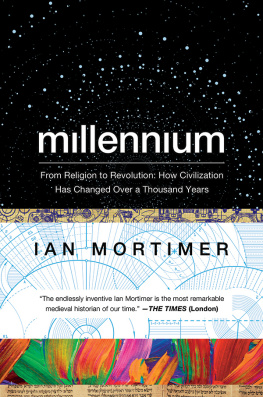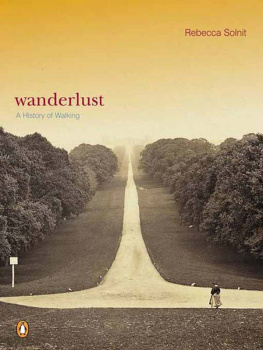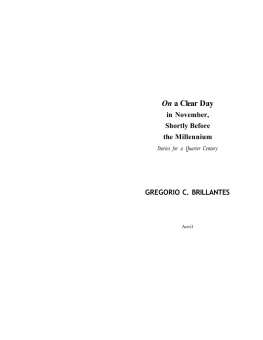Rebecca Solnit has written eighteen acclaimed works of non-fiction, including Wanderlust: A History of Walking and A Field Guide to Getting Lost. An activist, columnist and cultural historian, she has been awarded a Guggenheim Fellowship, the National Book Critics Circle Award and the Lannan Literary Award. She lives in San Francisco.
Like Simon Schama, Solnit is a cultural historian in the desert-mystic mode, trailing ideas like swarms of butterflies
Harpers
Fascinating, inspiring and beautifully written
George Monbiot
Hope in the Dark is great. The powerful in this world seem to want to frighten us into following their orders unquestioningly and this book offers us the key to liberation and that key is hope
Tony Benn
This is a book to be cherished, something to keep close at hand for those dark moments when you wonder whether the world really is a better place than it was fifty years ago
Independent on Sunday
Her passionate defence of direct action is a refreshingly corrective, while, crucially, her celebration of people power is proactive rather than complacent
Metro
A jewel of a book. Solnit reveals where we were, where we are, and the step-by-step advances that have been made in human rights, as we stubbornly stumble out of the darkness
Studs Terkel
ALSO BY REBECCA SOLNIT
Secret Exhibition: Six California Artists of the Cold War Era
Savage Dreams: A Journey into the Landscape
Wars of the American West
A Book of Migrations: Some Passages in Ireland
Wanderlust: A History of Walking
Hollow City: The Siege of San Francisco and the
Crisis of American Urbanism
As Eve Said to the Serpent: On Landscape, Gender and Art
River of Shadows: Eadweard Muybridge and the
Technological Wild West
A Field Guide to Getting Lost
Storming the Gates of Paradise: Landscapes for Politics
A Paradise Built in Hell: The Extraordinary Communities
that Arise in Disaster
Infinite City: A San Francisco Atlas
The Faraway Nearby
Unfathomable City: A New Orleans Atlas
Men Explain Things to Me
The Encyclopaedia of Trouble and Spaciousness

REBECCA SOLNIT

This Canons edition published by Canongate Books in 2016
First published in Great Britain in 2005 by Canongate Books Ltd,
14 High Street, Edinburgh EH1 1TE
www.canongate.tv
This digital edition first published in 2016 by Canongate Books
Copyright Rebecca Solnit 2016
The moral right of the author has been asserted
First published in the United States of America in 2004
by Nation Books, 250 W. 57th Street, 15th Floor
New York, NY 10107
British Library Cataloguing-in-Publication Data
A catalogue record for the book is available on
request from the British Library
ISBN 978 1 78211 907 4
eISBN 978 1 84767 683 2
Contents
Nothing that has ever happened should be regarded as lost for history.
Walter Benjamin
If you dont like the news... go out and make some of your own.
Newsman Wes Niskers closing salutation
on radio station KSAN in the 1970s
Foreword to the Third Edition (2015)
Grounds for Hope
Y our opponents would love you to believe that its hopeless, that you have no power, that theres no reason to act, that you cant win. Hope is a gift you dont have to surrender, a power you dont have to throw away. And though hope can be an act of defiance, defiance isnt enough reason to hope. But there are good reasons.
I wrote this book in 2003 and early 2004 to make the case for hope. The text that follows is in some ways of its momentit was written against the tremendous despair at the height of the Bush administrations powers and the outset of the war in Iraq. That moment passed long ago, but despair, defeatism, cynicism, and the amnesia and assumptions from which they often arise have not dispersed, even as the most wildly, unimaginably magnificent things came to pass. There is a lot of evidence for the defense.
Coming back to the text more than a dozen tumultuous years later, I believe its premises hold up. Progressive, populist, and grassroots constituencies have had many victories. Popular power has continued to be a profound force for change. And the changes weve undergone, both wonderful and terrible, are astonishing. The world of 2003 has been swept away. Its damage lingers, but its arrangements and many of its ideologies have given way to new onesand, more than that, to a sea change in who we are and how we imagine ourselves, the world, and so many things in it. This is an extraordinary time full of vital, transformative movements that could not be foreseen. Its also a nightmarish time. Full engagement requires the ability to perceive both. The twenty-first century has seen the rise of hideous economic inequality, perhaps due to amnesia both of the working people who countenance declines in wages, working conditions, and social services, and the elites who forgot that they conceded to some of these things in the hope of avoiding revolution. The rise of Silicon Valley as a global power center has eliminated and automated countless jobs, enhancing economic inequality; it has produced new elites and monstrous corporations from Amazon, with its attack on publishing, authors, and working conditions, to Google, which is attempting to build a global information monopoly in myriad arenas and in the process amassing terrifying powers, including the power that comes with sophisticated profiles of most computer users. The major tech companies have created and deployed surveillance capacities that the Kremlin and FBI at the height of the Cold War could not have dreamed ofin collaboration with the government that should be regulating them. The attack on civil liberties, including the right to privacy, continues long after its Global War on Terror justifications have faded away.
Worse than these is the arrival of climate change, faster, harder, and more devastating than scientists anticipated.
Hope doesnt mean denying these realities. It means facing them and addressing them by remembering what else the twenty-first century has brought, including the movements, heroes, and shifts in consciousness that address these things now. Among them: Occupy Wall Street; Black Lives Matter; Idle No More; the Dreamers addressing the Dream Act and immigration rights; Edward Snowden, Laura Poitras, Glenn Greenwald, and the movement for corporate and government transparency; the push for marriage equality; a resurgent feminist movement; economic justice movements addressing (and in many cases raising) minimum wage and fighting debt peonage and the student-loan racket; and a dynamic climate and climate justice movementand the intersections between them all. This has been a truly remarkable decade for movement-building, social change, and deep, profound shifts in ideas, perspective, and frameworks for broad parts of the population (and, of course, backlashes against all those things).
The Uses of Uncertainty
Hope in the Dark began as an essay that I published online about six weeks after the United States launched its war on Iraq. It immediately went, as they say, viralit was widely circulated by email, picked up by a mainstream newspaper and many news websites, pirated by some alternative newspapers, even printed out and distributed by hand by someone who liked it. It was my first adventure in online publishing, as well as in speaking directly to the inner life of the politics of the moment, to the emotions and perceptions that underlie our political positions and engagements. Amazed by the ravenous appetite for another way of telling who and where we were, I decided to write this slender book. It has had an interesting life in several languages, and its a pleasure to revise it with this introduction and a few new chapters at the end, notes, and handsome redesign. Updating the book would have meant writing an entirely new book, so we chose to reissue the 2005 second edition with this additional material instead.

